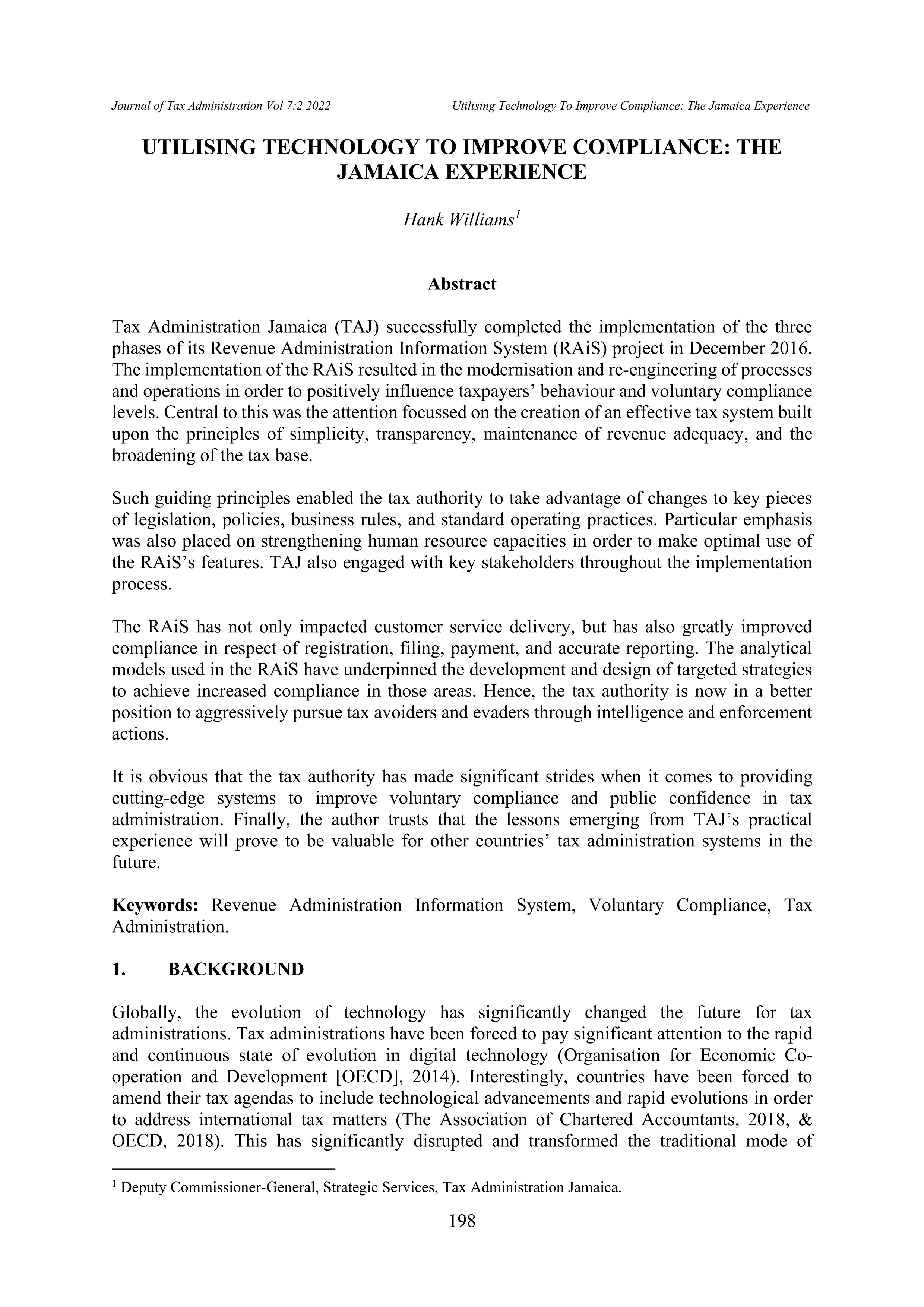Utilising Technology to Improve Compliance: The Jamaica Experience
Keywords:
Revenue Administration Information System, Voluntary Compliance, Tax AdministrationAbstract
Tax Administration Jamaica (TAJ) successfully completed the implementation of the three phases of its Revenue Administration Information System (RAiS) project in December 2016. The implementation of the RAiS resulted in the modernisation and re-engineering of processes and operations in order to positively influence taxpayers’ behaviour and voluntary compliance levels. Central to this was the attention focussed on the creation of an effective tax system built upon the principles of simplicity, transparency, maintenance of revenue adequacy, and the broadening of the tax base.
Such guiding principles enabled the tax authority to take advantage of changes to key pieces of legislation, policies, business rules, and standard operating practices. Particular emphasis was also placed on strengthening human resource capacities in order to make optimal use of the RAiS’s features. TAJ also engaged with key stakeholders throughout the implementation process.
The RAiS has not only impacted customer service delivery, but has also greatly improved compliance in respect of registration, filing, payment, and accurate reporting. The analytical models used in the RAiS have underpinned the development and design of targeted strategies to achieve increased compliance in those areas. Hence, the tax authority is now in a better position to aggressively pursue tax avoiders and evaders through intelligence and enforcement actions.
It is obvious that the tax authority has made significant strides when it comes to providing cutting-edge systems to improve voluntary compliance and public confidence in tax administration. Finally, the author trusts that the lessons emerging from TAJ’s practical experience will prove to be valuable for other countries’ tax administration systems in the future.
References
The Association of Chartered Accountants. (2018). Technology tools and the future of tax administration. London, England: ACCA.
Barbados Revenue Authority (2018, February 22). BRA launches phase 1 of new tax system [Press release]. https://bra.gov.bb/News/Press-Releases/BRA-Launches-Phase-1-of-New-Tax-Sy.aspx
Collosa, A (2020, December 9). Digital economy in Latin America and the Caribbean: What can tax administrations do? Afronomicslaw. https://www.afronomicslaw.org/2020/12/09/digital-economy-in-latin-america-and-the-caribbean-what-can-tax-administrations-do
Ernst & Young Global Ltd. (2019, May 27). How data analytics is transforming tax administration. https://taxinsights.ey.com/archive/archive-articles/data-analytics-is-transforming-tax-administration.aspx
Han, J., Kamber, M., & Pei, J. (2012). Data mining: Concepts and techniques. Waltham, MA: Elsevier Inc.
Henry, B. (2020, May 14). Double Blow. Jamaica Observer. https://www.pressreader.com/jamaica/daily-observer-jamaica/20200514
The Inter-American Center of Tax Administration, the Intra-European Organisation of Tax Administrations, & the Organisation for Economic Co-operation and Development (2020). Tax administration responses to COVID-19: Business continuity considerations. Paris, France: OECD Publishing.
Organisation for Economic Co-operation and Development. (2004). Guidance note: Compliance risk management: Managing and improving tax compliance. Paris, France: OECD Publishing.
Organisation for Economic Co-operation and Development. (2009, March). Information note: Managing and improving compliance: Recent developments in compliance risk treatment. Paris, France: OECD Publishing.
Organisation for Economic Co-operation and Development. (2014). Addressing the tax challenges of the digital economy (OECD/G20 Base Erosion and Profit Shifting Project). Paris, France: OECD Publishing. https://doi.org/10.1787/9789264218789-en
Organisation for Economic Co-operation and Development. (2018). Brief on the tax challenges arising from digitalisation: Interim report 2018. Paris, France: OECD Publishing.
Reyes-Tagle, G., & Ospina, L. (2021, March 9). Winds of change: An opportunity to reform tax administration in the Caribbean. Recaudando Bienestar. https://blogs.iadb.org/gestion-fiscal/en/wind-of-change-an-opportunity-to-reform-tax-administration-in-the-caribbean/
Statistical Institute of Jamaica. (2016, December 12). Jamaica industrial classification (2016). https://jic.statinja.gov.jm/
United Nations. (2019, April 5). Tax issues related to the digitalization of the economy: Report. New York, NY: United Nations.

Downloads
Published
How to Cite
Issue
Section
License
Copyright (c) 2022 Hank Williams

This work is licensed under a Creative Commons Attribution 4.0 International License.
Our open access status means that authors retain the copyright of their work. However, all papers published in JOTA are done so under a Creative Commons Attribution 4.0 International license (CC BY). This means that others can share and/or adapt your work without your permission as long as they follow certain rules, including attributing your work correctly.
You can learn more about this on our Open Access, Licensing, and Copyright Policies page.



